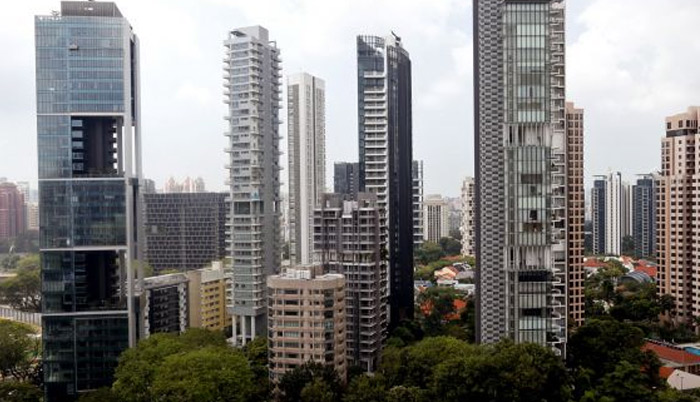![]() Home > Singapore
Home > Singapore
Now Could Be a Good Time to Buy Singapore Property Stocks

PHOTO: TODAY file photo
![]() January 26th, 2017 | 10:04 AM |
January 26th, 2017 | 10:04 AM | ![]() 4429 views
4429 views
SINGAPORE
Yes, you heard it right — Singapore’s home prices are set to make a comeback after a three-year losing streak. And analysts think property developer stocks are the best way to play that rebound.
Amid a restructuring push to boost a slowing economy, the government could signal its intention to reconsider property cooling measures as early as the budget speech in February, Ms Carmen Lee, head of research at Oversea-Chinese Banking said in an interview. That promises to boost the city-state’s largest developer stocks, including City Developments, which is one of the top picks for OCBC’s Lee and analysts at CIMB Research, Credit Suisse AG. Other potential winners include CapitaLand, UOL Group and OUE.
“Between buying physical property and buying stocks, stocks offer you the liquidity and they are pricing in all the negatives,” Ms Lee said. “They may not outperform in the next one to two quarters but if you ride this out for 18 months or so, you will see better upside.”
Home prices in Singapore have been driven by the city-state’s policies in recent years as the government vowed to rein in soaring values in one of Asia’s most expensive housing markets. Prices have declined by 11 per cent since 2013 and sales have dropped to about half of that year’s level.
An equal-weighted index of City Developments, CapitaLand, and UOL Group, Singapore’s three biggest property developers by market value, has outperformed Straits Times Index year-to-date after falling 3.6 per cent in 2016. CapitaLand, Southeast Asia’s largest property developer by market capitalisation, has dropped more than 20 per cent from 2013 levels, when shares reached a cyclical high.
Singapore developers are trading at a one-year forward price-to-book of 0.7 times, an “undemanding” valuation that is close to its 2008-2009 lows, according to Credit Suisse analysts including Louis Chua. “We believe the risk-reward to be attractive today, with a potential easing of measures a key upside optionality,” they wrote in a January research report.
Developer stocks have moved higher on expectations that there could be an easing of measures, Raymond Kong, a fund manager at One Asia Investment Partners Pte Ltd. in Singapore said in a phone interview. “We are looking for a pullback first; it just popped up too fast in a short period of time.”
Singapore adopted strict measures to restrict speculation on residential and industrial properties after home prices climbed to a record three years ago. The residential curbs have included a cap on debt-repayment costs at 60 per cent of a borrower’s monthly income, and higher stamp duties on home purchases, after low interest rates and demand from foreign buyers raised concern prices had risen too far too fast.
In November, the government indicated that it doesn’t intend to relax borrowing restrictions. “It is more prudent to have our current rules as the default position,” Mr Ong Ye Kung, Minister for Education said in a written reply to a parliamentary question.
Singapore’s housing market saw a surge in home sales in 2016 as developers sold more than 8,000 units, a 9 per cent increase compared with the previous year. Over 13,000 private residential units are expected to be completed this year, data from the Urban Redevelopment Authority showed. The pipeline supply will then drop to about 9,300 completed units in 2018 and 7,300 in 2019.
“As the supply overhang passes, we believe developers could resume land banking to position for growth,” CIMB analysts Lock Mun Yee and Yeo Zhi Bin wrote in a research note, referring to the practice of buying land as an investment. “With low gearing and deep capacity for reinvestment, we think that developers are well paced to tap into new opportunities.”
Source:
courtesy of TODAY
by Today
If you have any stories or news that you would like to share with the global online community, please feel free to share it with us by contacting us directly at [email protected]